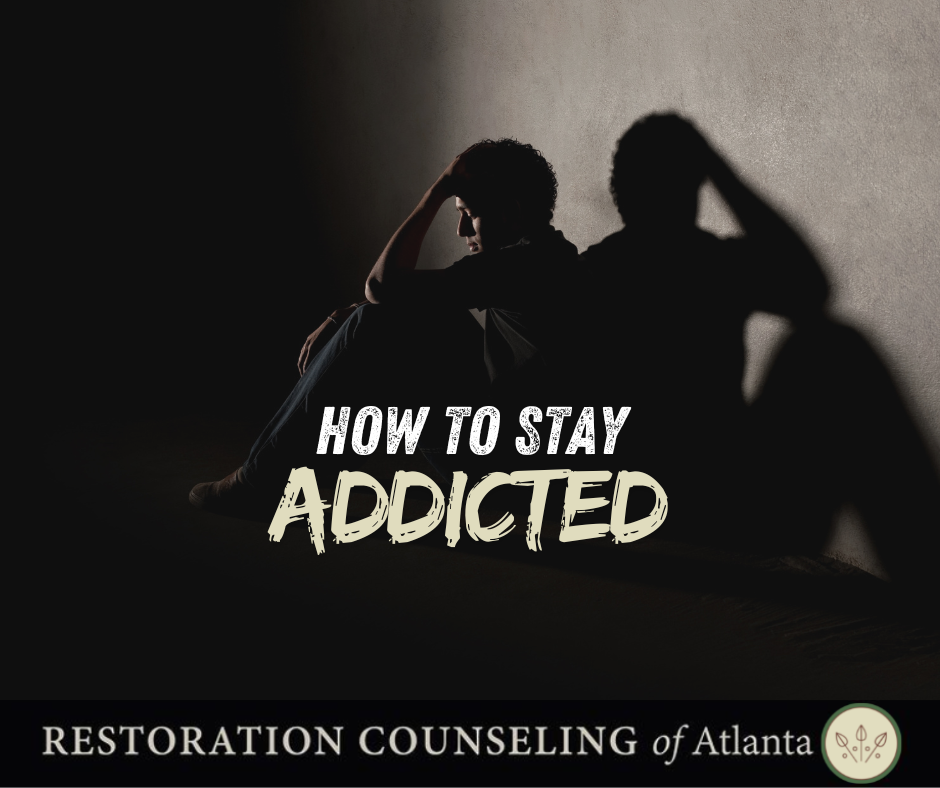Five Sure-Fire Strategies to Stay Stuck (…and what to do instead)
If you’re looking to stay trapped in your addiction indefinitely, here’s a step-by-step plan that works every time. These five habits are the perfect formula for stagnation, shame, and spiritual numbness. But if you’re ready to break free, you’ll want to recognize these traps–and walk the other way.
1. Stay in Denial
Whatever you do, don’t tell the truth–not even to yourself. Downplay your struggle. Pretend it’s “not that bad.” Remind yourself that you can quit at any time. If you have to lie to yourself and others, do it. Minimize the consequences. If you start to feel guilty, remind yourself why your addiction is justified or why you’re entitled to it. Avoid people who want to know the real you, because they might help you see your actual condition. It’s okay if the lies tear you apart–that’s what your addiction is for. Just keep numbing out—anything but honesty
What to do instead:
Freedom begins when you acknowledge the reality of your addiction, the havoc it wreaks, and your powerlessness to control it on your own. Confronting the reality of your condition is the first step to change. This acknowledgment is not a defeat, but a step towards the inner peace you crave deep inside.
“For I know my transgressions, and my sin is ever before me. Against you, you only, have I sinned and done what is evil in your sight…”
2. Try Harder to Control It Yourself
Unless you want to get better, don’t reach out for help. Don’t fall to your knees and tell God that this habit has become out of your control. Don’t join a support group–just make another private vow. Don’t surrender to God and rely on his strength daily–just “try harder.” Ignore your history of failed attempts to manage this habit on your own. White-knuckle it.
What to do instead:
Overcoming addiction is not about control, but about surrender. Let go. Stop relying on your own strength and power. Cry out to God. Ask for grace, not just willpower. Only His power can set captives free. Remember, seeking help is not a sign of weakness, but a step towards healing.
“I am the vine; you are the branches. Whoever abides in me and I in him, he it is that bears much fruit, for apart from me you can do nothing.” (John 15:5)
3. Compartmentalize Your Life
Keep your faith and your addiction in separate boxes. Don’t let them touch. Let everyone see the parts of your life that you’ve “got together,” and keep the addicted part tucked away in a closet only you know about. That way, you can have the best of both worlds. You’ll never feel quite whole, but don’t think about that–at least you’ll get to keep your addiction.
What to do instead:
Healing requires integrity—a whole life, not a divided one. Ask God to help you see the patterns of sin across every area of your life. In other words, take a holistic moral inventory and confess these shortcomings to someone who is spiritually mature.
“Search me, God, and know my heart… See if there is any offensive way in me.” (Psalm 139:23-24)
4. Keep It a Secret
Secrecy is sacred when you want to stay addicted. Let no one see the fault lines underneath the surface. You don’t want anyone meddling with the good thing you’ve got going by trying to “help” you or by holding you responsible for your actions. Confession is the path to recovery, so don’t do it. Certainly don’t ask anyone to be your accountability partner. Instead, keep hiding in shame and always cry in private.
What to do instead:
Sin grows in the dark and dies in the light. Confession breaks the power of secrecy and invites the healing presence of God and others. Confession doesn’t just lead to pain; it’s a crucial step towards healing and transformation, which leads to peace and joy.
“Confess your sins to one another and pray for one another, that you may be healed.” (James 5:16)
5. Stay Isolated
People are inconvenient, annoying, and sometimes, you even have to forgive them. Worst of all, sometimes they want to see the real you, and they might eventually see your addiction. They might even “love” you enough to ask you to change. In short, meaningful relationships are just a liability, and it’s better if you don’t become entangled in them.
What to do instead:
Authentic (not superficial) community is the “secret sauce” of transformation and healing. Find a group, a mentor, a friend who will walk with you. Seek out accountability that is both loving and firm, and commit to checking in regularly.
“Two are better than one… If either of them falls down, one can help the other up.” (Ecclesiastes 4:9-10)
The Bottom Line
The easiest way to find freedom is first to understand what’s keeping you stuck. If you want to stay addicted, keep walking the path of denial, self-effort, compartmentalization, secrecy, and isolation.
Once you know what’s keeping you stuck, the path to freedom becomes clear. If you want to be free, take the opposite path: honesty, surrender, integrity, confession, and community.

Jon Hunt enjoys working with teens, adults, and couples on issues including ADHD, anger, anxiety, panic attacks, and phobias, depression and suicidality, grief and trauma, insomnia, marital and premarital needs, pornography and behavioral addictions, and substance addictions. Jon uses insights from evidence-based therapeutic approaches but always stays grounded in the truth of God’s word.
jon@restorationcounselingatl.com, ext. 123

